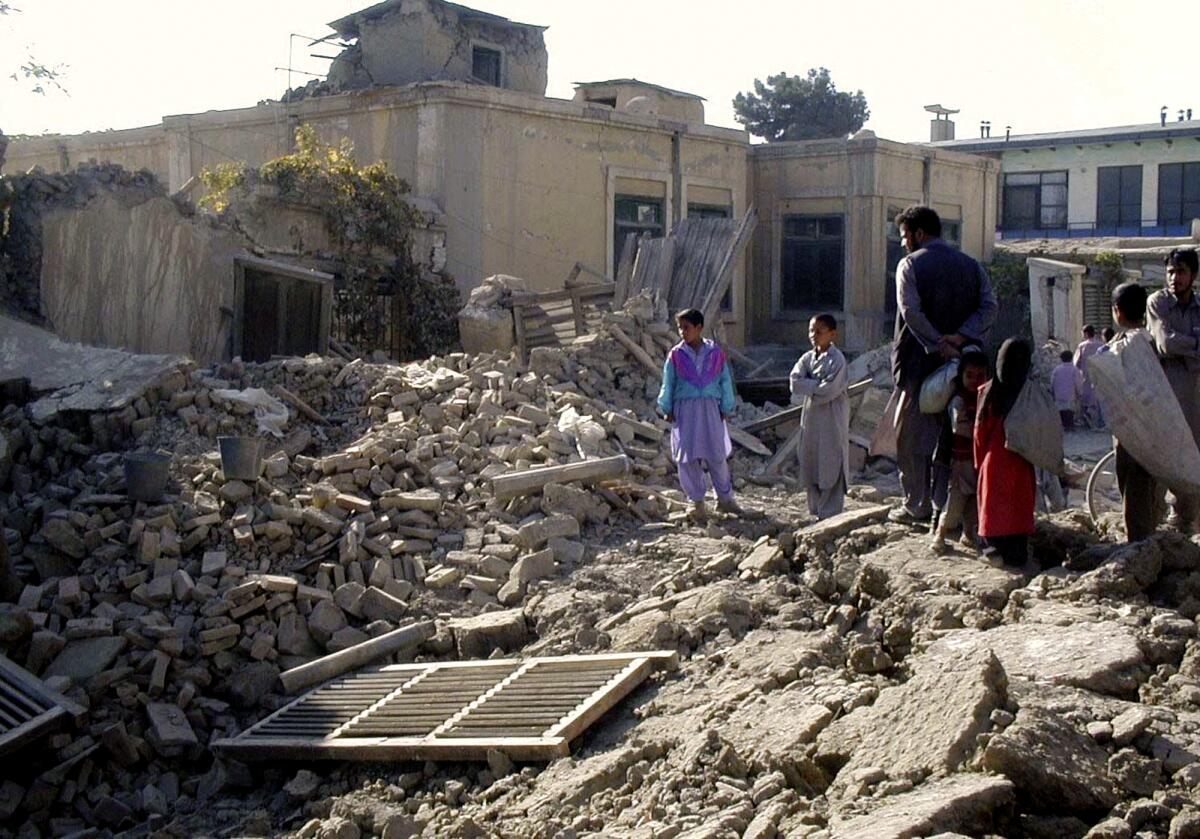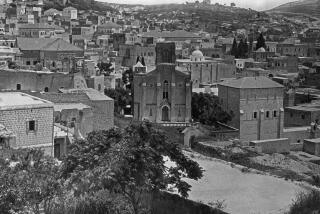Living through decades of grief for my Afghanistan

- Share via
In October 2001, my siblings and I were secretly watching an old Bollywood movie in our apartment in central Kabul. The volume knob on our Sony television was precisely at the pink marking that my mother had made with her nail polish on its silver body — loud enough for us to hear and understand what was happening on the screen, but not so loud that one of our neighbors, or worse than that, one of the many Taliban fighters who roamed our streets at night, could hear it.
As an additional precaution, my mother had sewn two blankets on top of each other and hung them on the only window of the room, which opened into a small balcony where we kept a large light on, to neutralize any flickering blue light from the screen that might spill outside through the cracks on the sides of blankets.
The movie was about some rich prince who was supposed to solve seven riddles in order to marry some princess. We were halfway through the third riddle when we all were jolted by a loud explosion, followed by our home shaking, and then the entire neighborhood plunging into darkness.
“It is the Americans!” my father said.
In the weeks building up to the U.S.-led invasion on Oct. 7, there were rumors racing around our neighborhood about commercial airplanes, full of living and feeling human beings, crashing into the world’s tallest buildings in America. Then a friend whose family lived between Kabul and Peshawar, Pakistan, arrived with a copy of a CNN news clip that was taped at the end of a Jean- Claude Van Damme movie. His mother had hidden the VHS tape roll, without its casing, in her bra under her chadari. Because this single copy was in such high demand, it took me two weeks of waiting — and giving away my copy of a newly released Bollywood movie as a bribe — to get my hands on it. I still vividly remember the icy silence in our living room as we watched the short clip four times in a row with half-open mouths. I was 16 years old that day.
Soon, graffiti started popping up everywhere in the city, condemning America and the West. “America the Great Satan!” was painted in black letters on the front wall of my high school. Another painted sign, on the wall of Kabul’s sports stadium where the Taliban flogged adulterers, chopped thieves’ hands and executed people, said, “Down with the American-glob-devouring imperialism.”
Then one day a truck full of Taliban arrived at our school and ushered us to some two dozen buses outside. Before anyone knew what was happening, they dropped us in front of the abandoned U.S. Embassy building, where many other buses were bringing students from other schools. Then a few trucks arrived and dumped rocks on the side of the road. A young Talib with a patchy beard and white turban climbed on top of one of the rock piles and started chanting slogans against all kinds of -isms, including journalism, and we shouted “death” in unison at the end of each slogan. Then we threw rocks at the large, black gates of the U.S. Embassy and someone burned an effigy.
Under the Taliban, the roughest and toughest man in our neighborhood was a young vigilante named Mullah Kebal who roamed the streets on foot and listened to Taliban taranas, the music-less religious chants, on a small radio. Nobody knew his real name, but everyone called him Mullah Kebal because he always carried an improvised kebal — whip — that he had fabricated himself by twisting three layers of electrical wire together and attaching them to a wooden handle.
With his large black turban, he was the ultimate punisher — the judge, the jury and the executioner in matters such as the length of men’s beard and hair, the modesty of women’s clothes and the level of one’s religiosity. In the mornings, he would park his made-in-China bicycle by the soccer field, his kebal resting on the seat of it, and make us recite entire chapters of the Quran and answer at least three out of five questions about the prophet’s famous battles before we could start playing soccer.
Then American airplanes started checkering the blue sky of Kabul with the white trails that they left behind, targeting government buildings, outposts on top of hills and moving Taliban pickup trucks. There were rumors that the planes were equipped with face recognition technology and could easily distinguish Taliban fighters from civilians. But one time they missed their target and hit a civilian apartment building, killing entire families, and another time a rocket landed in the playground, killing and wounding some children.
Fewer and fewer Taliban came to our neighborhood, and those who did come always drove in their pickups that they had smeared with dirt out of fear of being targeted from above. Mullah Kebal, as one neighbor put it, turned into a drop of water and the earth absorbed him. There was a new bully in town and people called it Mullah B-52.
On the day the Taliban left Kabul, my father dug out his shaving box that he had not touched for almost five years. Inside were a small copper bowl, a yellow brush with a red bottom, an old, half-empty tube of shaving cream, some blades and a white razor. As the blade moved from top to bottom and from left to right, and as tufts of beard started falling onto his white barber’s cloth, we watched our father become younger with every move of the razor. My brother brought our small red and black Panasonic tape recorder to the window of our living room and blasted Michael Jackson’s “The Way You Make Me Feel,” his favorite song, at full volume.
That afternoon, we watched one of our neighbors, a former school headmaster, set fire to her chadari in the playground, while a blue truck from Afghan National Radio and Television drove by blasting love songs through four gigantic loudspeakers mounted to its roof. Men started clapping, and we danced and followed the truck from one apartment building to the next.
By then, I’d also seen my home being destroyed, my school bombed and some of my relatives killed and maimed during the infighting between ethnic warlords, to which the Taliban owed its emergence in the first place. Over the next month or two, my relatives from the rural districts of Kandahar and Zabol arrived at my family’s home with sick women and children, telling stories of bombed weddings, forced disappearances and indiscriminate night raids by Americans and warlord allies searching for Taliban supporters.
Soon, Kabul would be blanketed with the familiar faces of violent, corrupt warlords on huge billboards, as an effort to revive their tainted images, and the country would belong to a few dozen American-allied families who had everything, while most Afghans had almost nothing.
There would be 20 more years of war.
And then, this August, I watched from my home in Ottawa as the house of cards that Americans had built in Afghanistan crumbled.
Just a day before Kabul fell to the Taliban, my sister Hosai went to work as usual but was sent home by her boss, who told her that she was no longer employed. Amid sobs, she told me how she never got married or went abroad, as many of her friends did, because she believed her life was in Afghanistan.
The next week or so, as I tried to get my siblings and cousins out of Afghanistan, was some of the toughest days of my life. I stopped eating and sleeping, and I felt as if I was going to have a panic attack. I was on the phone with my siblings as they were trying to push through the mass of people that had gathered around one of the gates at Kabul airport, where a Marine contact was waiting to bring them in. I screamed in agony as my sisters told me how they were whipped by the Taliban and tear-gassed by Americans at the gate, and I listened with horror when they told me about women, children and elderly women getting stampeded.
When their first attempt to get into the airport failed, I told them to try another gate, where they saw a woman that was standing beside them get shot in the face. When I finally managed to get them out of the country with the help of some journalist friends, Hosai called me from a refugee camp to let me know they were safe. But before she hung up, she said, “Isn’t it astonishing that up until a week ago I was helping refugees, and today I am a refugee myself? What a life.”
My parents only just started appreciating the enormity of the change that hit their lives as their children left. Suddenly, they found themselves alone in our large house, where they had dreamed of playing and spending time with their grandchildren. In our phone conversations, and her subsequent text messages, my mother started complaining about how she found it difficult to go into my siblings’ rooms, where their clothes, shoes, socks and framed pictures were still left in place.
Occasionally, and in passing, my mother has accused me of “taking everyone away from me.” To console her sad heart, she started sleeping in my siblings’ rooms. Recently, she told me that she has packed my siblings’ rooms and has been giving their clothes away to our relatives and neighbors.
In October 2001, my father, whose cynicism about everything political is legendary in my family, was surprisingly in the optimists’ camp. Not only did he predict the swift fall of the Taliban, but he also believed that this would be the last war, and that soon Afghanistan would become like Dubai.
Just days ago, when I called to check in on him, he first complained about the swarm of mosquitoes that he was fighting on our porch. Then, he told me about how he had taken strolls in the newly sprawled flea markets in Kabul, where people sell their home belongings, to “test the pulse of the market.” This was my father’s way of saying that he was thinking about selling our belongings and leaving the country.
I found it surprising because even when security was at its worst in Kabul, and we all feared for the lives of our working siblings and cousins, my father would dig in his heels and tell us to not “uproot” him every time my older brother, who lives in Britain, and I suggested that we should move our family out of Afghanistan. I guess the “roots” that my father was talking about were his children. But we are no longer in Afghanistan.
A few minutes after I hung up, he texted me in Persian on WhatsApp:
“Habib Jan, I am giving away your books.
I know how much you loved your books,
and with how much care and love you built that little library.
I hope you forgive me.”
Habib Zahori is a former New York Times reporter and a writer on the CBS sitcom “United States of Al.”
More to Read
A cure for the common opinion
Get thought-provoking perspectives with our weekly newsletter.
You may occasionally receive promotional content from the Los Angeles Times.









